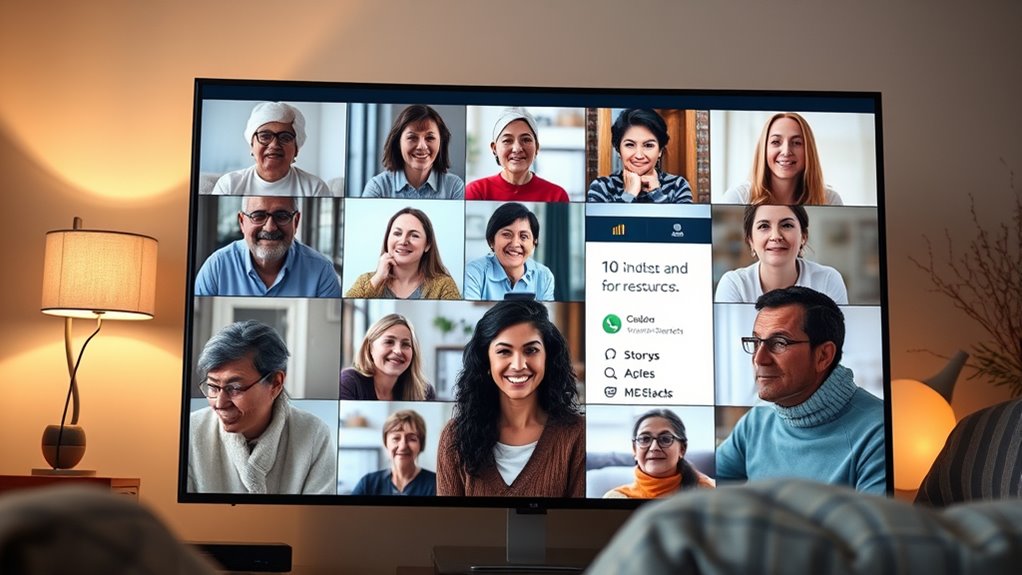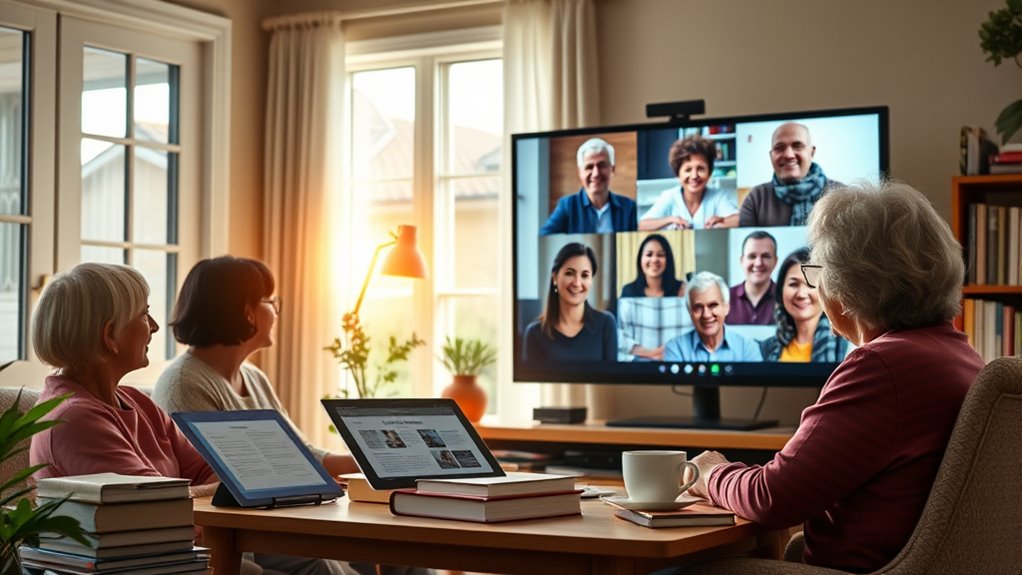Online communities for caregivers connect you with others facing similar challenges, offering emotional support, practical advice, and access to essential resources. You can join platforms like Facebook groups, specialized websites, or forums tailored to specific needs or cultural backgrounds. These networks help reduce isolation, boost confidence, and strengthen your caregiving skills. If you want to discover how to find, join, and benefit from these supportive spaces, there’s more to explore ahead.
Key Takeaways
- Online caregiver communities connect individuals with similar challenges, offering emotional support, resources, and practical caregiving tips regardless of location.
- Platforms include social media groups, specialized caregiving websites, and moderated forums that ensure safe, confidential interactions.
- There are culturally specific and diverse support networks for LGBTQ+ caregivers, veteran caregivers, and other niche communities.
- To join, search platforms like Facebook or AgingCare, review group rules, and verify moderation and privacy protections for safety.
- Participating in these groups reduces isolation, boosts confidence, and provides access to real-time advice, resources, and peer support.
Overview of Caregiver Support Networks

Caregiver support networks play a vital role in providing connection and assistance to those caring for loved ones. Support groups, especially online caregivers, connect you with others facing similar challenges, regardless of where you live. These networks often feature moderated spaces where you can share advice, experiences, and emotional support safely. Additionally, many of these networks emphasize the importance of community support in helping caregivers thrive. Engaging with others in these networks can significantly enhance your emotional resilience, allowing you to cope better with the demands of caregiving. Furthermore, many caregivers find that diversification in their support systems, much like diversification in retirement portfolios, can lead to more effective coping strategies.
Online caregiver communities help reduce feelings of isolation, boosting your confidence and overall well-being. Popular platforms include Facebook groups, specialized websites, and organization-sponsored forums focused on conditions like dementia or chronic illness. Additionally, many online communities offer resources for effective stress management that can greatly benefit caregivers. These resources are particularly valuable as they provide practical strategies to handle the demands of caregiving. Research suggests that prophetic dreams can also serve as a source of guidance during challenging times, helping caregivers navigate their emotional landscape.
Most of these online caregiver networks are available 24/7, offering flexible support that fits into your busy schedule. By joining these networks, you gain access to a supportive community that understands your journey and provides encouragement whenever you need it.
Types of Online Platforms for Caregivers

Online platforms for caregivers come in various formats designed to meet different needs and preferences. You can join Online Communities like Facebook groups, specialized forums, or dedicated websites that promote caregiver support.
These platforms often include unmoderated or professionally moderated spaces, giving you the option to remain anonymous and flexible in your participation. Popular examples include Facebook groups such as Aging Care Caregiver Forum and Dementia Caregivers Support, which focus on specific issues. Additionally, these platforms often prioritize user privacy to ensure a safe sharing environment for caregivers. Many of these communities also encourage sharing tips on bohemian style living room decor that provide a comforting environment for caregivers and those they care for. Engaging in these communities can foster a sense of belonging and connection, similar to celebrity friendships that thrive despite challenges. Moreover, participating in these groups can enhance your interpersonal relationships and provide insights into shared experiences.
Virtual platforms also offer options like daily email digests, private messages, or scheduled Zoom meetings, so you can choose how to engage. Additionally, many communities provide resources and insights on newborn feeding options, helping caregivers make informed choices for the infants they support.
These online communities enable caregivers, especially those in remote or rural areas, to access support, share experiences, and obtain resources without geographical barriers.
Specialized Communities for Diverse Caregiver Groups

You can find online communities that specifically support diverse caregiver groups, addressing their unique cultural and personal needs. These networks, like those for LGBTQ+ caregivers or veteran caregivers, offer tailored resources and safe spaces for sharing experiences. Joining these groups helps you connect with others who truly understand your specific challenges. Additionally, these communities often provide insights on financial security, which can be crucial for caregivers managing their own retirement planning. Furthermore, many caregivers benefit from learning about renewable energy options, such as bike generators, which can help them reduce living costs while supporting sustainability.
Culturally Specific Support Networks
Culturally specific support networks play an essential role in addressing the unique challenges faced by diverse caregiver communities. These online caregiver groups, like African American and LGBTQ+ caregiver networks, offer tailored resources that acknowledge cultural and community-specific issues. As a minority caregiver, you may encounter higher stress levels and barriers to mainstream support, making these specialized groups crucial. They focus on fostering culturally sensitive discussions, healing practices, and community building, all accessible via email or virtual platforms. This approach helps reduce feelings of isolation, improve mental health, and strengthen community resilience. Additionally, participating in culturally specific support networks ensures you receive relevant, respectful guidance that truly meets your needs, empowering you through shared experiences and cultural understanding. The rise of online support networks has further enhanced these communities, providing immediate access to resources and connections. Moreover, these networks can promote active listening and empathy, vital skills for nurturing caregiver relationships and fostering a supportive environment. Engaging in these supportive environments can also lead to creative Halloween decoration ideas, offering caregivers a chance to share festive inspirations that can lighten their spirits during challenging times.
Community for LGBTQ+ Caregivers
Community support for LGBTQ+ caregivers offers a safe space to share experiences and find understanding tailored to your unique challenges. Through online support, you can connect with others who understand the intersection of your identity and caregiving responsibilities.
Dedicated platforms like email-based groups provide a secure environment to discuss issues without solicitations or advertisements, while organizations like Openhouse host monthly Zoom meetings for real-time support.
These caregiver communities focus on addressing stresses, challenges, and shared experiences specific to LGBTQ+ caregivers of adults with chronic health issues. They emphasize creating affirming spaces where you can explore topics like discrimination, identity, and community building. Additionally, these communities often highlight the importance of shared experiences that can foster a greater sense of belonging and understanding among members.
How to Find and Join Online Caregiver Groups

Start by searching social media platforms like Facebook with keywords such as “Caregiver Support Communities” or specific condition terms.
Make sure to check the group’s rules and privacy policies before joining to protect your information. Many groups also provide cookie consent management to help you understand how your data is used.
Look for moderated groups that focus on your needs to find a safe and supportive environment. Additionally, consider joining groups that share grocery savings strategies to help manage the financial aspects of caregiving.
Search for Relevant Platforms
To find online caregiver groups that suit your needs, begin by searching with keywords like “Caregiver Support Communities” or specific illness names on social media platforms such as Facebook or specialized caregiving websites. Use online directories like Caregiver Action Network or AgingCare to locate community forums and support groups. Look for groups hosted on platforms like Facebook, Reddit, or dedicated caregiving forums that specify their focus areas and membership requirements. Eye patches can be a useful addition to your self-care routine, so consider joining groups that often provide real-time updates on various caregiving resources and tips. Additionally, joining groups that focus on gold investments can help caregivers understand financial options for their future. Regular participation in these communities can also enhance your mental clarity and emotional resilience. Use search filters and reviews to find active, moderated groups that prioritize safety and confidentiality. Proper maintenance of caregiving resources is essential for prolonging their effectiveness. Here’s a quick overview to help you visualize your options:
| Platform | Focus Area | Membership Requirements |
|---|---|---|
| General caregiving | Open or approval needed | |
| Specific illnesses | Public or private groups | |
| Caregiving Forums | Support & advice | Usually free, moderated |
Additionally, consider joining groups that often provide real-time updates on various caregiving resources and tips.
Use Specific Group Terms
Once you’ve identified platforms and directories that host caregiver groups, using specific search terms can help you find the most relevant communities. For example, search for “Caregiver Support Community,” “Dementia Caregivers Support,” or “Memory Care Support Group” on Facebook to locate Online caregiver groups tailored to your needs.
Dedicated websites like AgingCare or the Caregiver Action Network list active Online caregiver support groups, making it easier to find a community that fits your situation. Look for specialized groups such as “ALZConnected” for Alzheimer’s caregivers or “Caring for Elderly Parents.” Joining these groups can also provide insights into boosting libido with vitamins, which can be beneficial for caregivers managing stress and personal well-being.
Join moderated groups focusing on sharing experiences and advice, and verify their privacy settings to ensure a safe environment. Using precise group terms streamlines your search and connects you with supportive, relevant communities. Additionally, you may find that many caregivers benefit from state-specific retirement options, which can enhance their financial planning during caregiving.
Ensure Group Safety
Ensuring your safety when joining online caregiver groups is essential for a positive and supportive experience. First, verify that the group is moderated to maintain a safe environment free from solicitations and harmful content. Look for reputable organizations like the Alzheimer’s Association or Caregiver Action Network, which prioritize member safety and privacy.
Carefully read group descriptions and member guidelines to confirm the focus on support without advertisements or promotional posts. Ensure the platform uses secure login procedures and privacy settings to protect your personal information.
Checking reviews or feedback from current members can also give you insight into the group’s professionalism, safety, and supportiveness. Taking these steps helps you find a trustworthy space where you can share and learn confidently.
Benefits of Participating in Virtual Support Networks

Participating in virtual support networks offers caregivers numerous benefits that can substantially improve their well-being and caregiving effectiveness. These online communities provide peer support, helping you share experiences and reduce feelings of isolation, no matter where you are. Engaging in virtual support networks has been shown to lower caregiver stress and boost confidence through emotional support and practical tips. Since many digital support groups operate 24/7, you can access help, share concerns, or seek advice whenever it fits your schedule. Additionally, these networks connect you to specialized resources and professional guidance tailored to specific conditions, enhancing your caregiving skills and effectiveness.
| Benefit | Description |
|---|---|
| Peer support | Connect with others facing similar challenges |
| Flexibility | Access resources anytime, anywhere |
| Reduced isolation | Feel less alone through ongoing community engagement |
| Stress reduction | Lower caregiver stress with emotional backing |
| Increased confidence | Gain empowerment and practical caregiving strategies |
Resources and Additional Support Options

Online resources and support options offer caregivers a wealth of tools and services to strengthen their caregiving journey. Support resources like care assessment tools, online quizzes, and educational materials help you identify your needs and find tailored assistance.
Online support groups, such as The Caregiver Space Community and AgingCare’s Caregiver Forum, connect you with peers for practical advice, emotional support, and shared experiences. Organizations like the Alzheimer’s Association and VA Caregiver Support provide webinars, support groups, and resource directories to connect you with local and national caregiver assistance programs.
Many online communities also serve as a starting point to access additional resources, including training courses, mental health services, and local support groups, all designed to bolster your resilience and confidence in caregiving.
Frequently Asked Questions
How Do I Find a Private Live in Caregiver?
You want to find a private live-in caregiver, so start by checking trusted local home care agencies or staffing services that specialize in in-home care.
You can also search websites like Care.com or AgingCare.com to find qualified candidates.
Don’t forget to interview potential caregivers, check references, and ask for referrals from healthcare providers or senior centers.
These steps help guarantee you find someone reliable and a good fit for your needs.
When to Stop Being a Caregiver?
You should consider stopping your caregiving role when your health, safety, or well-being suffer substantially, and formal support options are available.
If caregiving causes burnout, severe stress, or interferes with other essential responsibilities, it’s time to reassess.
Seek advice from support groups or professionals to determine the best moment to step back, ensuring both your needs and the care recipient’s needs are properly addressed.
What Is the Hardest Thing About Being a Caregiver?
Imagine you’re stuck in a 90s sitcom, juggling too many roles—this mirrors your biggest challenge. The hardest part about being a caregiver is managing your emotional well-being while supporting your loved one.
You often feel unprepared, stressed, and isolated. Balancing responsibilities with your personal life can lead to burnout and health risks.
Financial strain adds to this, making it tough to stay resilient without support or guidance.
What Are Three Signs of Caregiver Stress?
You might notice caregiver stress through emotional signs like persistent anxiety, depression, or irritability.
Physical symptoms such as fatigue, headaches, or sleep issues often appear as well.
Behaviorally, you could withdraw socially, neglect your own needs, or rely more on alcohol or medications.
Recognizing these three signs early helps you seek support and practice self-care, preventing burnout and maintaining your health and well-being.
Conclusion
Joining online caregiver communities is like finding a lighthouse in a storm—your beacon of support and understanding. These virtual networks can guide you through challenges, offering comfort, advice, and connection whenever you need it. By tapping into these resources, you’re not alone on your caregiving journey. Embrace the digital lighthouse and let it lead you toward strength, resilience, and community, illuminating your path through even the darkest seas.









